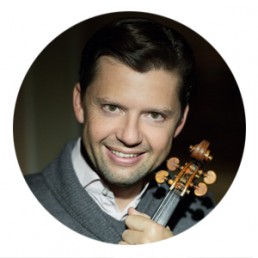Brahms | dvoŘÁk
Henrik Nánási, conductor / Julian Rachlin, violin
Philarmonic Orchestra from the Teatro Comunale di Bologna

General Music Director of the Komische Oper in Berlin from 2012 to 2017, Henrik Nánási conducted the new productions of Mazeppa, Eugene Onegin, Gianni Schicchi, La Belle Hélène, Die Zauberflöte, Cosi fan tutte, Don Giovanni, Bartók’s Bluebeard’s Castle, Prokofiev’s The Fiery Angel, Massenet’s Cendrillon and Mussorgsky’s The Sorochyntsi Fair, as well as shots of Der Rosenkavalier, Rusalka and Rigoletto. Since his appointment in 2012, the Berlin Komische Oper has been proclaimed “Opera House of the Year” by Opera World magazine in 2013 and won the award as “Opera Company of the Year 2015” at the Opera Awards.
Julian Rachlin, violinist, violist and conductor, is one of the most brilliant and appreciated musicians of our time. During his first years of career he performed as a soloist together with the most prestigious orchestras and the greatest conductors. He has recently established himself as a highly successful conductor, appreciated for his dynamic style and vibrant interpretations, thanks to an ever-increasing presence on international stages. He is Principal Guest Conductor of the Royal Northern Symphony, the Turku Philharmonic Orchestra and the Kristiansand Symphony Orchestra.
Program
Johannes Brahms
Violin Concerto in D major op. 77
Antonin Dvořák
Symphony No. 8 in G major, op. 88
Monday 31 May 2021 | H 19.30
Auditorium Manzoni
| SINGLE SEATS valid for all scheduled concerts. | |||||||||||
| The seats in the hall are spaced in order to ensure distance. | |||||||||||
| PRICES | |||||||||||
| FULL TICKET PARTERRE AND GALLERY | € 25 | ||||||||||
| REDUCED TICKET FOR SEASON TICKET HOLDERS* | € 20 | ||||||||||
| REDUCED TICKET FOR UNDER 30* | € 15 | ||||||||||
| *Titles that give the right to the reduction must to be shown in case of verification by the staff or personnel. | |||||||||||
MAIN PARTNER
Composers
Violin Concerto in D major op. 77
Year of composition: 1878, Pörtschanch am Wörther See
First performance: Lipsia, January 1, 1879
Movements:
1.Allegro ma non troppo
2.Adagio
3.Allegro giocoso
In the Concerto in D major for violin and orchestra, as everywhere in Brahms, the spirit of bass music insinuates itself into the noble genre, particularly in the third movement. Between 1877 and 1879, Brahms spent his summer holidays in Pörtschach, on Lake Wörthersee, «where – he wrote to a friend – the melodies fly so thick and fast that you have to be careful not to step on them». There the Concerto was born.
Symphony No. 8 in G major, op. 88
Year of composition: 1889
First performance: National Theater in Prague, February 2, 1890
Movements:
1.Allegro con brio
2.Adagio
3.Allegretto grazioso
4.Allegro ma non troppo
The charm of this music lies in the absolute evidence of the poetic ideas that are embodied in elementary rhythms of immediate grip and in suggestive timbral atmospheres, in musical figures that are imprinted in the memory even before they have reached their complete sound expansion. The Symphony No. 8 in G major has an imprint of serenity and lightness that comes from an interior calm achieved and also from the awareness of its own sphere that Dvořák had conquered in the wake of the great German symphonic tradition of the Romantic age.



